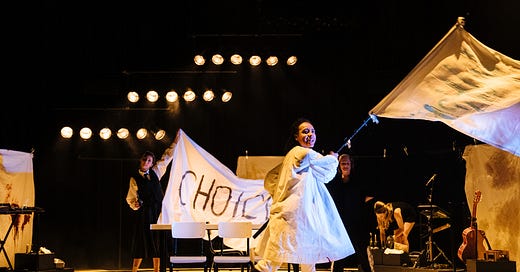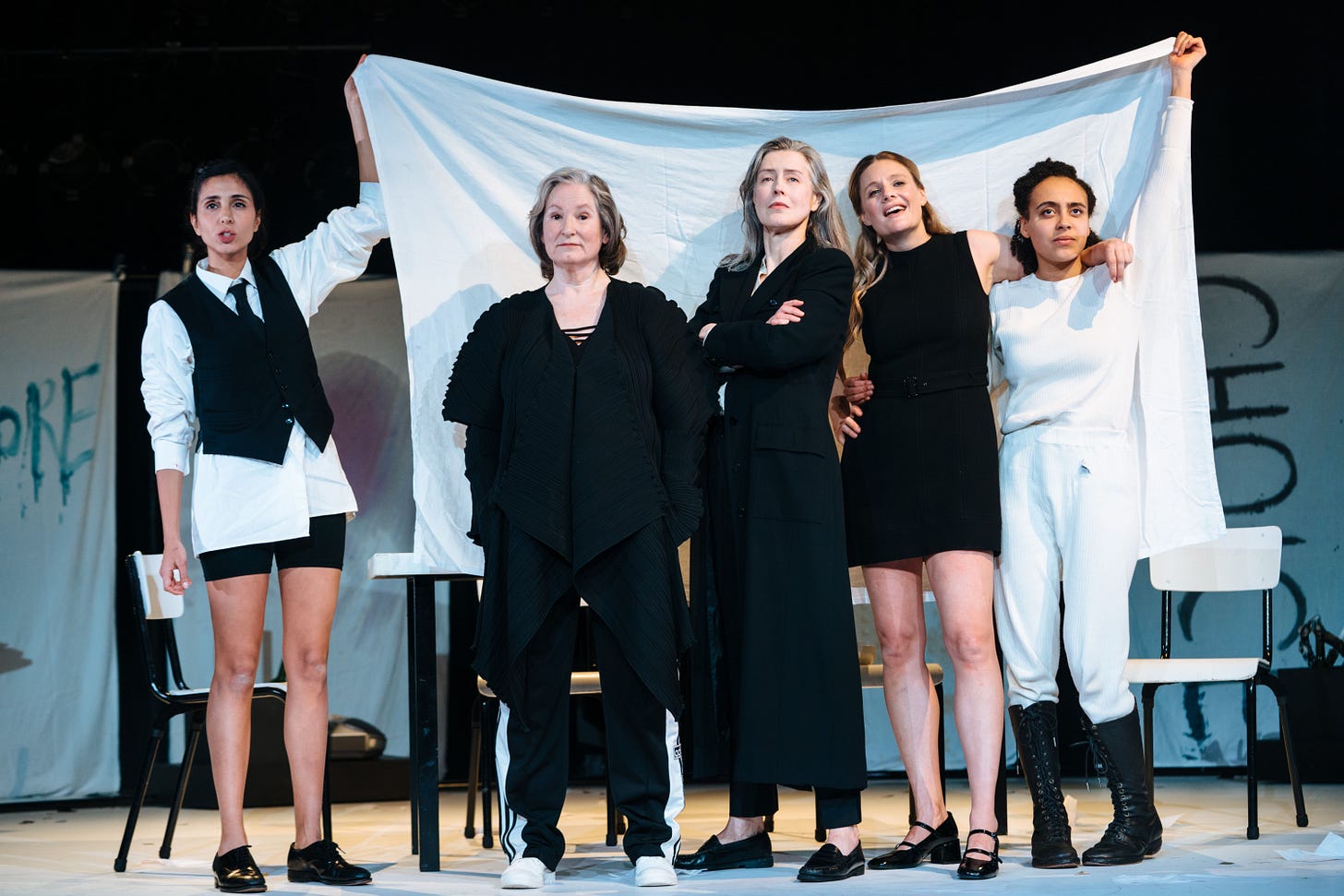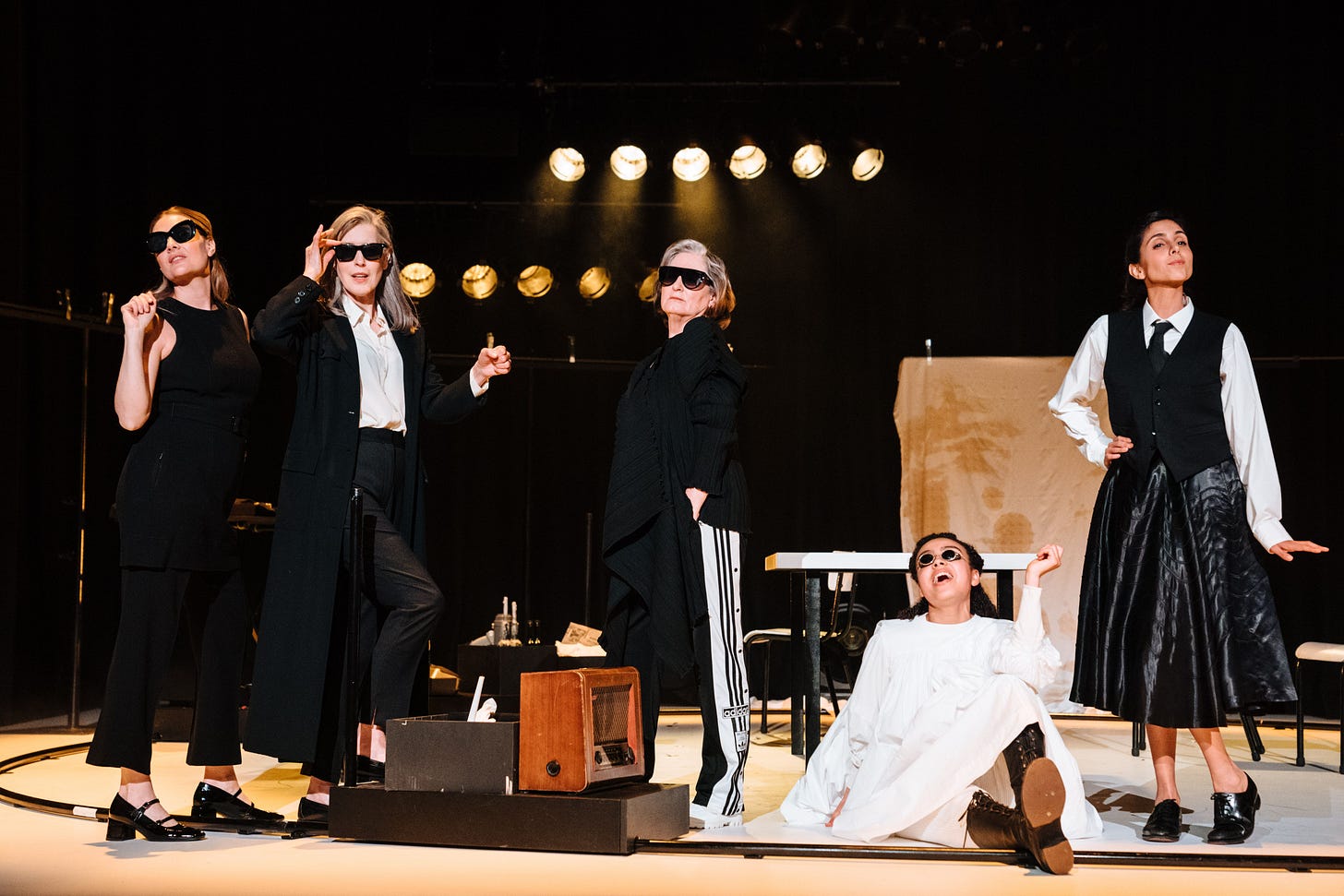The Years at Harold Pinter Theatre Review
Eline Arbo's production is a remarkable feat for modern literary plays
It's not every day that a show allegedly stops almost nightly due to audience members fainting. But do not be put off by these incidents reflecting the intensity of the story (though a heads up, it is imperative to read and fully understand the content warnings in advance) - as soft lights gently raise to reveal five silhouettes about to present a story for the ages, The Years makes its much-anticipated West End transfer, fresh from an acclaimed engagement at the Almeida Theatre - a production not to be missed.
Based on the 2008 memoir by the Nobel Prize-winning Annie Ernaux, Eline Arbo's English language stage version is nothing short of eloquent. The story is set between World War II and the 2000s in France, where political conflicts, social unrest and the rise of artistic liberation dominate much of Annie, the author's life, recounted through the lens of five cast members sharing one role.
The concept of ‘years’ metaphorically represents both the narrator's life cycle by decade, and wider societal commentary on rituals and change. The notable absence of the personal pronoun ‘I’ somewhat reflects a communal experience - despite not verbally signposted, alternating usage of ‘we’ and ‘her’ hints at the relevance of the piece, such that audiences of various generations and backgrounds can resonate with.
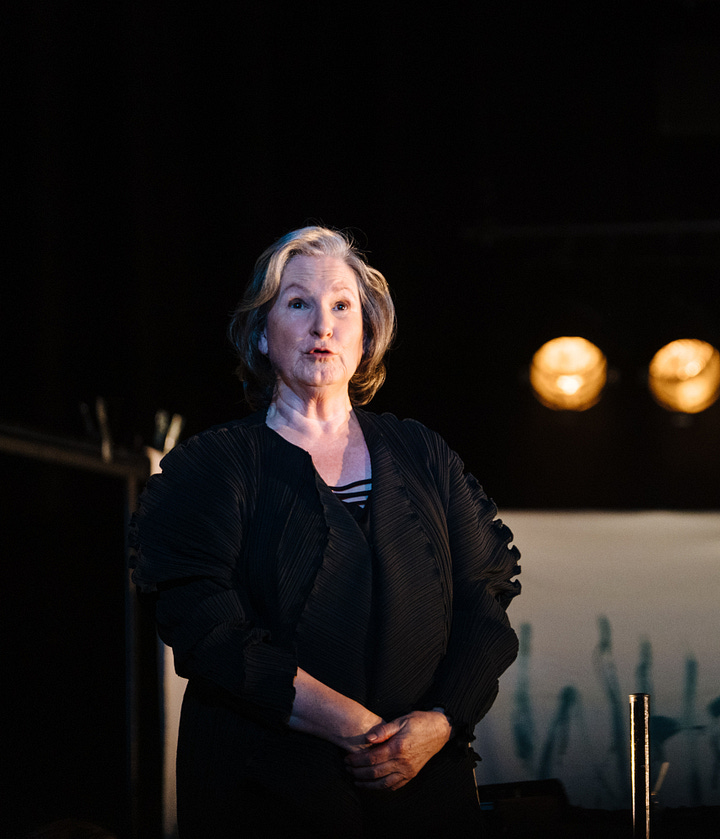
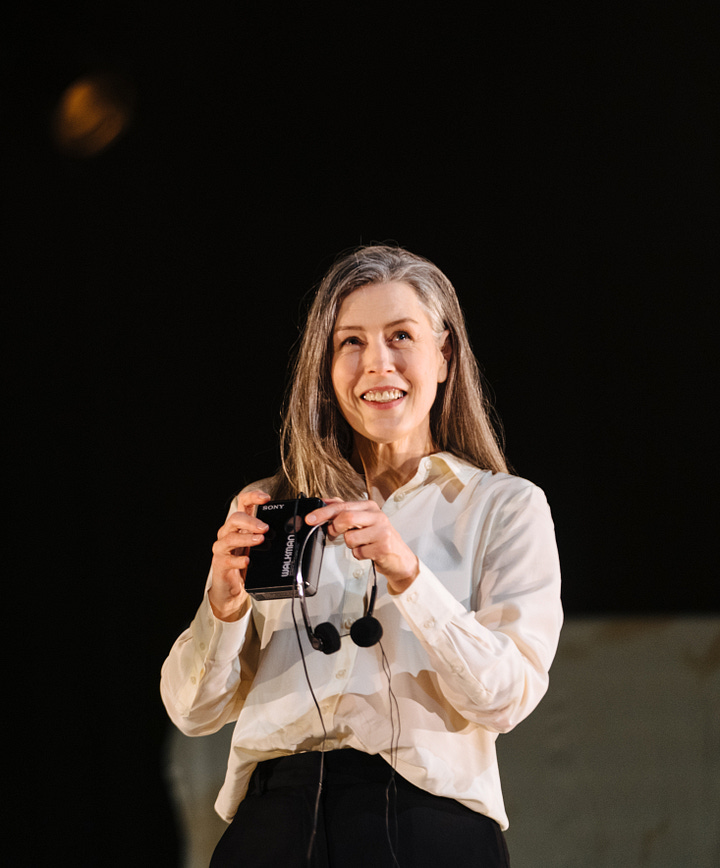
A narrative quality is prominent from an almost cyclical writing structure, snapping from descriptions of portraits beginning with the phrase ‘in a photo…’, where the cast recreates camera snapshots taken from Annie's life; to in-depth accounts relating to those photos, circling back to a monologue on each voice represented. Arbo notes in the programme that the Ernaux's book does not present itself as the most obvious material to adapt for the stage, yet putting quotes in striking visual context rightfully justifies the decision to translate from page to stage - simply powerful.
The cast captures undivided attention at the palm of their hands - from nuanced voice work to physical contrast between motion and stillness, all within the space of an interval-less two hours. Every member of the company is worthy of mention for lasting impressions both as individuals and as a collective - Deborah Findlay, Romola Garai, Gina McKee, Anjli Mohindra and Harmony Rose-Bremner. Through variations in voice, movement and dialogue, each cast member takes turns in playing out various stages of the female experience, from girlhood to womanhood and motherhood; the delivery of scenes is deliberately paced to maximise dramatic impact.
The audience would one moment be helplessly in hysterics witnessing Annie's pubertal maturity, another gasping as blood smears down from bodies, and another holding breath to mentions of coercions and scar-filled relationships - their ability to manipulate the narrative is what makes the piece unmistakably human.
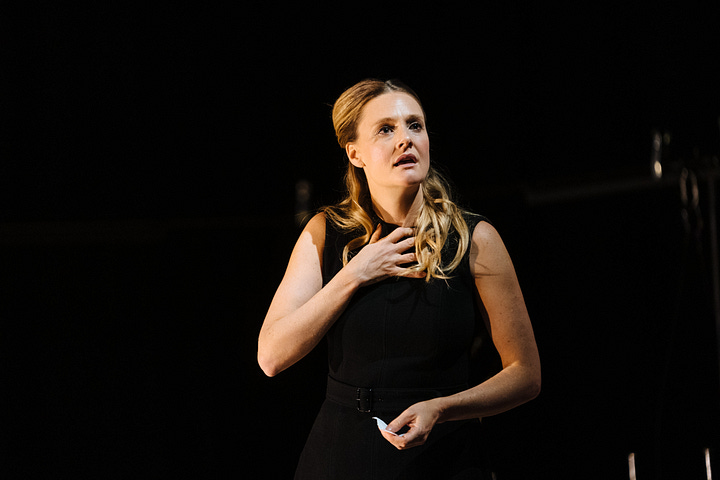
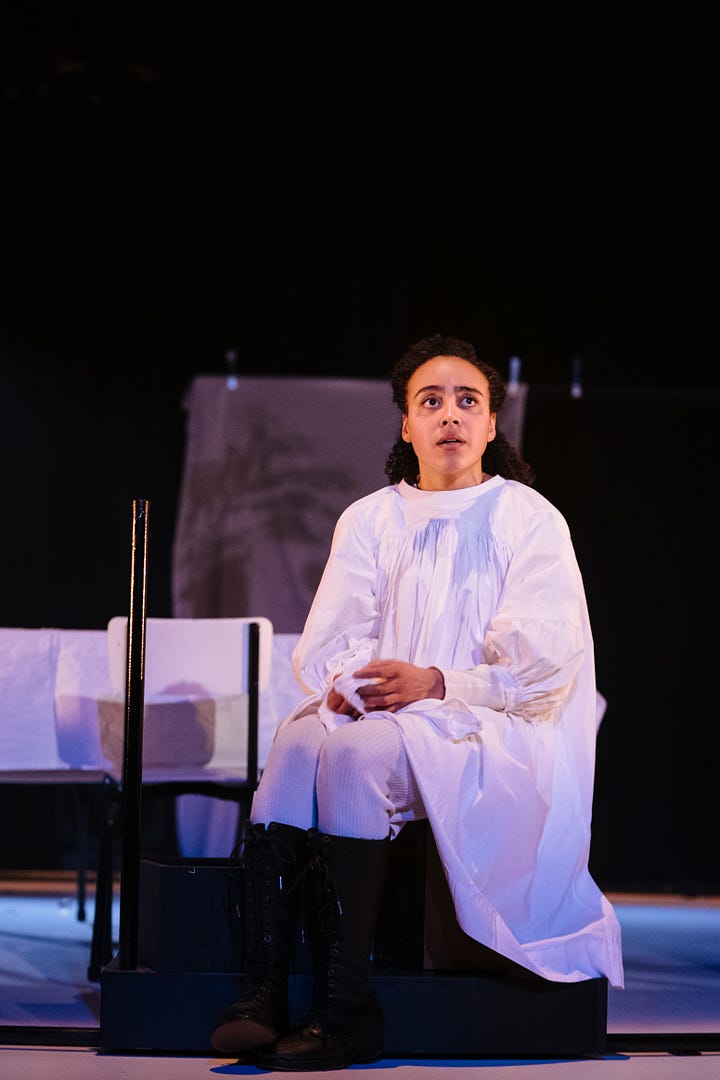
Subtlety in all aspects of the production design has clearly been given impactful (praiseworthy) thought - Varja Klosse's (assisted by Fraser Craig) contrasting lighting states corresponds to shifts from ‘scene’ to ‘portrait’; Thijs Van Vuure's (assisted by Bryony Blackler) soundscapes dip in and out, just the right amount to highlight storyline progression; and Juul Dekker's suspended cloths and few pieces of furniture, wrapped in a rotating circular platform of instruments for live music set an organic canvas for tension and release - all of which constitute a mutually-complementing relationship between material, performance and design.
A thought-provoking watch weaving between time periods and deeply profound monologues, there can be challenges for those struggling to engage with graphic themes, yet the fact that explicit portrayals of desire, pleasure, pregnancy and abortion appear shocking exactly matches the creatives’ hope to create an urgent, female-led artistic response to society. The piece almost fulfills a responsibility to be a timely awakening for the under-explored voice theatres have yet to actively programme - it's a masterclass in modern literary for the stage - one that will stay with audiences long after the final ovation.
★ ★ ★ ★ ★
The Years plays at the Harold Pinter Theatre until 19 April. For more information and to book tickets, visit the production website.
Tickets and Accessibility
🎟️ Tickets were kindly gifted by the press representatives for the show. All views remain my own, without any input or approval from the producers or venue. Standard tickets are available from £17.50 (all online bookings via ATG subject to a £3.95 transaction fee); £25 Rush tickets are available on each performance day at 10am via the TodayTix app.
♾️ The show features incidental music and occasional use of microphones throughout. Detailed sensory timings are as follows: (may contain spoilers)
At 3 mins, the first instance of snapping into contrasting lighting states (warm to harsh white) occurs on the line ‘distant generation’. This occurs throughout during obvious contextual shifts.
At 1 hour there is one use of a loudspeaker by a cast member.
At 1 hour 2 mins on the word ‘tone’ there is a sudden instance of amplified rock music. This occurs again at 1 hour 12 mins on the line ‘independent once more'.
At 1 hour 42 mins after a verbal countdown to ‘1’, a cast member releases a small handheld glitter cannon that makes a bang from compressed gas downstage centre.
In addition, there are graphic depictions of various sensitive themes and subject matters that demand audience advisory - content warnings are displayed on front of house signage and further information may be requested in advance.


